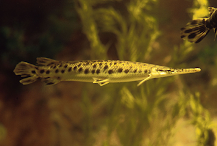Taxonomy Refresher - Lepisosteus
Kingdom: Animalia – multicellular, eukaryotic
organisms. Most of which consume organic material, breathe oxygen, are able to
move, can reproduce sexually, and grow from the blastula during embryonic
development
Phylum: Chordata – animals with five distinctive
physical characteristics: a notochord, a hollow dorsal nerve cord, an endostyle
or thyroid, pharyngeal slits, and a post-anal tail
Subphylum: Vertebrata – all animals with
spinal cords and bony or cartilaginous backbones (birds, mammals, reptiles,
amphibians, fish)
Superclass: Osteichthyes – commonly
referred to as “bony fish” due to their skeletons being primarily composed of bone
tissue.
Class: Actinopterygii – a class of bony fish
known as “ray-finned fishes”. This is because their fins are webs of skin
supported by bony or horny spines which attach directly to the radials.
Actinopterygians make up nearly 99% of all freshwater and marine fish species.
Subclass: Neopterygii – this subclass of
ray-finned fish contains infraclasses Holostei and Neopterygii (comprised
of over half of all living vertebrate species).
Infraclass: Holostei – a group of freshwater
ray-finned bony fish which is divided into two major clades: Ginglymodi (gar)
and Halecomorphi (only one living genus including two species of bowfin).
Both clades are characterized by lightly ossified bones and their reduced spiracles,
which are considered vestigial.
Order: Lepisosteiformes – See “clade”
Clade: Ginglymodi – a clade of ray-finned fish
containing modern-day gars and their extinct relatives (Lepidotidae family
and orders Seminototiformes and Kyphosichthyiformes
Family: Lepisosteidae – or “gar” are found in
N. America and Central America in shallow and weedy water. They are an ancient
(240 million years old) group of ray-finned fish characterized by their long
and tubular bodies, elongated jaws, and armored ganoid scales. Gars also have
the ability to gulp atmospheric air due to their vascularized swim bladders.
Genus: Lepisosteus – the common name
for this genus of freshwater fish is “slender gars”. They are bony with long,
narrow snouts that are native only to North America. The four known species
are: oculatus, osseus, platostomus, and platyrhincus
(Information and photos from www.wikipedia.org)





Comments
Post a Comment